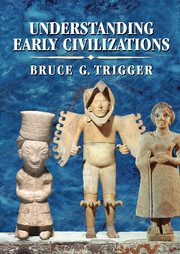Book contents
- Frontmatter
- Contents
- List of Illustrations
- Preface
- Understanding early civilizations
- Introduction
- Sociopolitical organization
- Economy
- Cognitive and symbolic aspects
- 19 Conceptions of the Supernatural
- 20 Cosmology and Cosmogony
- 21 Cult
- 22 Priests, Festivals, and the Politics of the Supernatural
- 23 The Individual and the Universe
- 24 Elite Art and Architecture
- 25 Literacy and Specialized Knowledge
- 26 Values and Personal Aspirations
- 27 Cultural Constants and Variables
- Discussion
- References
- Index
23 - The Individual and the Universe
Published online by Cambridge University Press: 05 June 2014
- Frontmatter
- Contents
- List of Illustrations
- Preface
- Understanding early civilizations
- Introduction
- Sociopolitical organization
- Economy
- Cognitive and symbolic aspects
- 19 Conceptions of the Supernatural
- 20 Cosmology and Cosmogony
- 21 Cult
- 22 Priests, Festivals, and the Politics of the Supernatural
- 23 The Individual and the Universe
- 24 Elite Art and Architecture
- 25 Literacy and Specialized Knowledge
- 26 Values and Personal Aspirations
- 27 Cultural Constants and Variables
- Discussion
- References
- Index
Summary
If views about humans' relations to the cosmos – about the creation of human beings, the purpose of human existence, and the fate of individuals after death – reflected the roles that different classes played in society, one might expect the self-image of lower-class people to have been humbler and more pessimistic where the upper classes advanced the most extravagant claims concerning their own superiority. Such assertions tended to be made in territorial states and in city-state systems where nobles were distinguished as a hereditary group from commoners. Combining these two criteria, one might expect the lower classes to have had the most positive self-image among the Yoruba and Mesopotamians (city-states with no formally defined hereditary nobility) and progressively humbler ones among the Aztec and Maya (city-states with hereditary nobles), in Egypt (a territorial state that deemphasized its hereditary nobles), and in Shang China and the Inka kingdom (territorial states with strong hereditary nobilities).
The ethnographic literature on the Yoruba provides no detailed account of the creation of the first human beings. Oduduwa, the god most often credited with creating the earth, was also the ancestor of the first Yoruba kings. The god Orisala was charged by the high god Olorun with the ongoing task of creating individual humans – shaping their bodies (ara) from semen and menstrual blood in their mothers' wombs. If Orisala were angry, he might produce deformities in fetuses.
- Type
- Chapter
- Information
- Understanding Early CivilizationsA Comparative Study, pp. 522 - 540Publisher: Cambridge University PressPrint publication year: 2003



